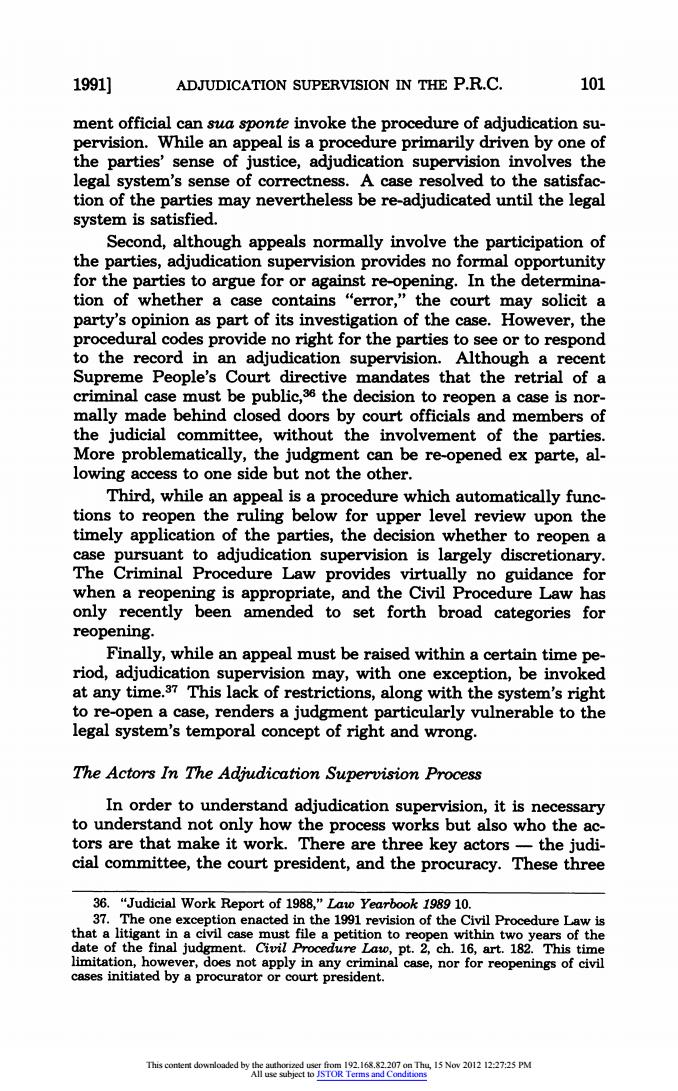正在加载图片...

1991] ADJUDICATION SUPERVISION IN THE P.R.C. 101 ment official can sua sponte invoke the procedure of adjudication su- pervision.While an appeal is a procedure primarily driven by one of the parties'sense of justice,adjudication supervision involves the legal system's sense of correctness.A case resolved to the satisfac- tion of the parties may nevertheless be re-adjudicated until the legal system is satisfied. Second,although appeals normally involve the participation of the parties,adjudication supervision provides no formal opportunity for the parties to argue for or against re-opening.In the determina- tion of whether a case contains "error,"the court may solicit a party's opinion as part of its investigation of the case.However,the procedural codes provide no right for the parties to see or to respond to the record in an adjudication supervision.Although a recent Supreme People's Court directive mandates that the retrial of a criminal case must be public,36 the decision to reopen a case is nor- mally made behind closed doors by court officials and members of the judicial committee,without the involvement of the parties. More problematically,the judgment can be re-opened ex parte,al- lowing access to one side but not the other. Third,while an appeal is a procedure which automatically func- tions to reopen the ruling below for upper level review upon the timely application of the parties,the decision whether to reopen a case pursuant to adjudication supervision is largely discretionary. The Criminal Procedure Law provides virtually no guidance for when a reopening is appropriate,and the Civil Procedure Law has only recently been amended to set forth broad categories for reopening. Finally,while an appeal must be raised within a certain time pe- riod,adjudication supervision may,with one exception,be invoked at any time.37 This lack of restrictions,along with the system's right to re-open a case,renders a judgment particularly vulnerable to the legal system's temporal concept of right and wrong. The Actors In The Adjudication Supervision Process In order to understand adjudication supervision,it is necessary to understand not only how the process works but also who the ac- tors are that make it work.There are three key actors-the judi- cial committee,the court president,and the procuracy.These three 36."Judicial Work Report of 1988,"Law Yearbook 1989 10. 37.The one exception enacted in the 1991 revision of the Civil Procedure Law is that a litigant in a civil case must file a petition to reopen within two years of the date of the final judgment.Civil Procedure Law,pt.2,ch.16,art.182.This time limitation,however,does not apply in any criminal case,nor for reopenings of civil cases initiated by a procurator or court president. This content downloaded by the authorized user from 192.168.82.207 on Thu,15 Nov 2012 12:27:25 PM All use subject to JSTOR Terms and Conditions1991] ADJUDICATION SUPERVISION IN THE P.R.C. 101 ment official can sua sponte invoke the procedure of adjudication supervision. While an appeal is a procedure primarily driven by one of the parties' sense of justice, adjudication supervision involves the legal system's sense of correctness. A case resolved to the satisfaction of the parties may nevertheless be re-adjudicated until the legal system is satisfied. Second, although appeals normally involve the participation of the parties, adjudication supervision provides no formal opportunity for the parties to argue for or against re-opening. In the determination of whether a case contains "error," the court may solicit a party's opinion as part of its investigation of the case. However, the procedural codes provide no right for the parties to see or to respond to the record in an adjudication supervision. Although a recent Supreme People's Court directive mandates that the retrial of a criminal case must be public,36 the decision to reopen a case is normally made behind closed doors by court officials and members of the judicial committee, without the involvement of the parties. More problematically, the judgment can be re-opened ex parte, allowing access to one side but not the other. Third, while an appeal is a procedure which automatically functions to reopen the ruling below for upper level review upon the timely application of the parties, the decision whether to reopen a case pursuant to adjudication supervision is largely discretionary. The Criminal Procedure Law provides virtually no guidance for when a reopening is appropriate, and the Civil Procedure Law has only recently been amended to set forth broad categories for reopening. Finally, while an appeal must be raised within a certain time period, adjudication supervision may, with one exception, be invoked at any time.37 This lack of restrictions, along with the system's right to re-open a case, renders a judgment particularly vulnerable to the legal system's temporal concept of right and wrong. The Actors In The Adjudication Supervision Process In order to understand adjudication supervision, it is necessary to understand not only how the process works but also who the actors are that make it work. There are three key actors - the judicial committee, the court president, and the procuracy. These three 36. "Judicial Work Report of 1988," Law Yearbook 1989 10. 37. The one exception enacted in the 1991 revision of the Civil Procedure Law is that a litigant in a civil case must file a petition to reopen within two years of the date of the final judgment. Civil Procedure Law, pt. 2, ch. 16, art. 182. This time limitation, however, does not apply in any criminal case, nor for reopenings of civil cases initiated by a procurator or court president. This content downloaded by the authorized user from 192.168.82.207 on Thu, 15 Nov 2012 12:27:25 PM All use subject to JSTOR Terms and Conditions